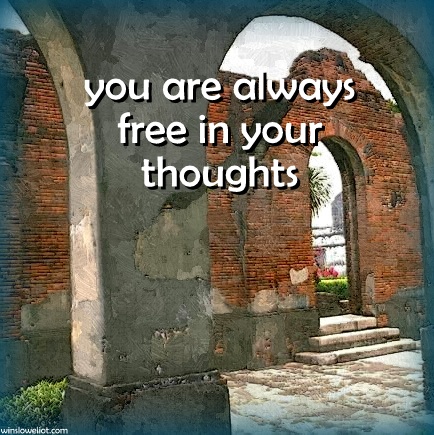
Stillness 9-21:
Nothing keeps you feeling stuck and enclosed except thinking that it does. Even when things seem most dire, it’s possible to think your way out of the situation—by reframing it rather than by changing the so-called “reality” of it. When I wrote novels, one of the things I loved most was the freedom inherent in the practice of story-telling. Nothing constrained me in terms of characters or plot except what I allowed to constrain me. Constraints themselves are neither good or bad nor right or wrong—you can think your way free of any of them. It’s up to you.
As we head into the equinox period of balancing the light and the dark, this becomes clearer than ever. I used to dread the bitter winter chill until a friend said, “Oh, I love winter! I don’t have to do anything.” She was a single mother of a young child, so childcare in the summer was challenging; she worked as a waitress in an area that burgeoned with tourists and out-of-towners during the busy summer months; and she grew her own vegetables which she stored, canned, bottled, and pickled so she and her child would have enough to eat through the winter. Winter was her rest, more cozy time to be with her child, a time to relax and catch up with herself.
My picture of winter was reframed in that instant. I saw how easily and quickly we can see things differently. And that’s true of anything—anything at all. It’s not always about counting our blessings, which actually can make us feel bad about not feeling happier. Or telling ourselves how lucky we are compared to someone who’s starving to death in Yemen—that too can just make us feel guilty and sad.
Instead, pull into your central star: your solar plexus. Live your life from your center, like the sun lives from its still center and lets all the other planets be in their orbits. The sun is not selfish nor greedy—it’s a calm, neutral, beneficent light that radiates light and warmth. You can do that too. Be neutral and warm as you shine your light outward, onto other people, situations, struggles, and nature.
With every thought that comes your way, try out its opposite. Try to balance yourself. Don’t get hooked on outrage or trepidation. Think of this: if you didn’t hear some terrible news, you wouldn’t be fearful about it. Your ancient amygdala brain wouldn’t be in that exhausting fight-or-flight-or-freeze mode. Are you aware that our entire bodies get pummeled with stress hormones simply when we read or hear about something terrible? Those hormones automatically and unconsciously course through our bodies from ancient—and essential—responses for survival. If we’re not literally in a life-and-death situation, they instead become debilitating and lasting anxiety and stress that continues to course through us, with nowhere to go and nothing to do except suffer.
Outrage is just as impactful as fear on our physical bodies. Outrage also originates in our primordial, original limbic system. It turns out that it feels good to be furious! Fury overrides morality and rationality! It actually feels a lot better than being reasonable does. Outrage, as neuroscientists have discovered, is very much like any other addiction: it triggers dopamine reward receptors in our brain, giving us as much of a rush as thrill or danger does. Outrage becomes its own reward and we want more and more of it to feel good. Whether you’re hooked on listening or reading to the news, or you’re constantly on social media, or you’re a gambling or cocaine addict, what happens in your brain is pretty much the same.
But you can choose to be free of all that. It’s up to each one of us to choose to either be outraged and fearful or calm and helpful. The power of thought is much more interesting and wise than you might think. Move out of the ruins of what you think is “real” and fly freely in our beautiful day-and-night, light-and-dark equanimous sky.
